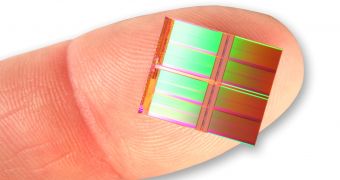Intel and Micron has just announced that the companies have managed to develop the world’s first 20 nanometer 128 gigabit (Gb), multilevel-cell (MLC) NAND device that will enable SSD manufacturers to build more spacious drives at lower price points.
The chip was actually developed by IM Flash Technologies (IMFT), a joint venture between the two companies, and according to its makers is the first such device in the industry to enable a terabit (Tb) of data to be stored on a fingertip-size package by using eight such dies.
Furthermore, IMFT managed to achieve this increase in capacity without having to drop the performance of its NAND chips, which were designed to meet the ONFI 3.0 specifications.
Even though these don’t work at the full 400MT/s (megatransfers per second) speed the standard is capable of, they still manage to reach a respectable 333MT/s, which should deliver some impressive performance when coupled with today’s SSD controllers.
The companies also revealed that the key to their success with 20nm process technology is a new cell structure that allows for more aggressive cell scaling than conventional architectures.
“It is gratifying to see the continued NAND leadership from the Intel-Micron joint development with yet more firsts as our manufacturing teams deliver these high-density, low-cost, compute-quality 20nm NAND devices,” said Rob Crooke, Intel vice president and general manager of Intel’s Non-Volatile Memory Solutions Group.
“Through the utilization of planar cell structure and Hi-K/Metal gate stack, IMFT continues to advance the technological capabilities of our NAND flash memory solutions to enable exciting new products, services and form factors,” concluded the company’s rep.
The first samples of the 128Gb memory device will be available in January, with mass production being expected to be started in the first half of the next year.

 14 DAY TRIAL //
14 DAY TRIAL //